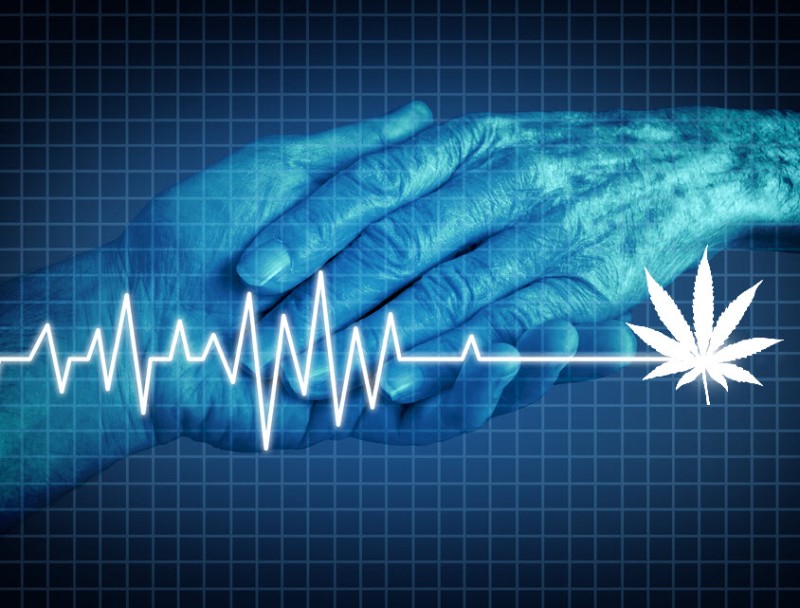Terminally Ill Californians Will Have Access to Medical Marijuana in Hospitals

Senator Ben Hueso's sponsored bill, Ryan's Law, has finally been assented to by Governor Gavin Newsom.
This means that dying patients can now be treated with medical marijuana. Medical personnel and other qualified health care workers can now relieve the pains of these extremely sick Californians during their final months.
For a very long time, terminally ill patients have had to manage their symptoms with opiates. For some, these opiates are no longer effective in managing their pains, they've had to live the last months of their lives in intense pain. Those who got relief from the drug felt its harsh effects, they were barely awake to enjoy the presence of their family and friends.
The approval of the new medical marijuana bill is more than welcome in the California health department. Hospitals and health care centers can now allow these patients to find much-needed relief by using approved medical cannabis drugs.
California's Cannabis Legislation
California is one of the first states in the United States to legalize the use of medical cannabis. The current medical cannabis program has been used for over 25 years. During this period, it is quite unfortunate that the patients who needed the drug the most were not permitted to use it.
Senator Hueso described the situation as 'inconceivable'. One of the reasons why he was focused on the approval of Ryan's law is that he believes those suffering the most medically should be the first on a queue for medical cannabis.
Medical marijuana has been tested and proved to be effective in managing the symptoms of terminal ailments. So, the government does not have any good excuse for delaying the approval of the bill.
Now that the bill has been approved, it will correct the wrong
in the previous medical cannabis bill. Patients will not be forced to consume heavy mind-altering drugs like opiates which have been proven to have less effect in alleviating their symptoms. Neither will they have to commit a felony by purchasing cannabis illegally.
The background story behind Ryan's Law
Ryan's law is named after the late Ryan Bartell. Ryan died after a long battle with pancreatic cancer. He was a California native and coast guard veteran before he died in 2018.
In the last weeks of his life, Ryan was administered morphine and fentanyl to manage his pain, however, the drugs only made him fall into a deep sleep. His family and friends were unable to converse with him. After days of consulting other healthcare centers, they decided to move him to a facility that permitted medical cannabis treatment for dying patients.
His family was determined to ensure he had a perfect quality of life in his last days, and he did.
The facility treated him with approved medical cannabis, and during this invaluable end-stage, Ryan enjoyed the positive effects of the drugs. He was able to stay awake and make lasting memories with his family.
In a conversation with the media Ryan's father, Jim, recalled how fulfilling Ryan's last days were. He said that his son's experience with medical cannabis was nothing like what he experienced with the treatment of the harsh opiate. He also mentioned how happy he was to have been able to look into Ryan's eyes and tell him just how much he was loved by family and friends.
Jim Barell became an advocate for medical cannabis because there was no way his son could have enjoyed his final moments without the magic drugs.
Senate Bill 311/Ryan's Law
The bill was sponsored by South San Diego County's Representative, Senator Ben Hueso, and co-sponsored by the East County's representative, Senator Brian Jones.
While the bill permits healthcare facilities to treat terminally Ill patients with cannabis, it tries as much as it can to regulate the way the drug is delivered into the system.
Patients are prohibited from vaping and inhaling the drug, neither can it be administered to them as an emergency treatment. The health care workers are mandated to ensure the drug is used safely. Other patients, visitors, and staff must not be put at risk.
Previously Rejected, Approved now
Approval for the bill fell through in 2019 when Governor Newsom expressed concerns over the bill's language.
The Governor's reason for vetoing the bill was that it would have caused confusion between federal laws and California laws.
He said approving the bill could have jeopardized the funding of federal facilities within the state. Rather than clarify the laws, the governor chose to eliminate any possible implications that could be linked to the consumption of cannabis in health centers.
Before the bill was presented to Governor Newsom again, Sen. Hueso wrote the U.S Department of Health and Human Services (HHS) and asked them to clarify the issue.
A letter issued by the Centers for Medicare and Medicaid Services (CMS) was returned to Hueso. The center explained that there were no approved federal laws directed at the subject. The center maintained that there have never been any instances where a federal health center or hospital in the state lost funding for treating patients with medical cannabis.
The confirmation from the health agency allayed every fear over the loss of medical fundings in the state. A provision was included to safeguard healthcare facilities from being penalized for allowing patients to use medical weed.
With all these in place, Sen. Hueso remains confident that medical workers can implement the provisions in the Ryan Law without fear of backlash. So far the health centers have a safe operation in place and comply with other state laws, there won't be an issue.
Bottom Line
Hats off to Sen Ben Hueso for fighting for a meaningful cause over the last years.
Terminally ill Californian patients can now enjoy the last days of their lives with their families. They can also be hopeful for expanded end-of-life treatment options. Like Hueso said the approval of this bill is a critical move that will guarantee solace, humanity, and provide dignity to these patients.
CANNABIS AND THE TERMINALLY ILL, READ MORE...
TRUMP SIGNS BILL TO ALLOW MARIJUANA FOR TERMINALLY ILL, NOW WHAT?








